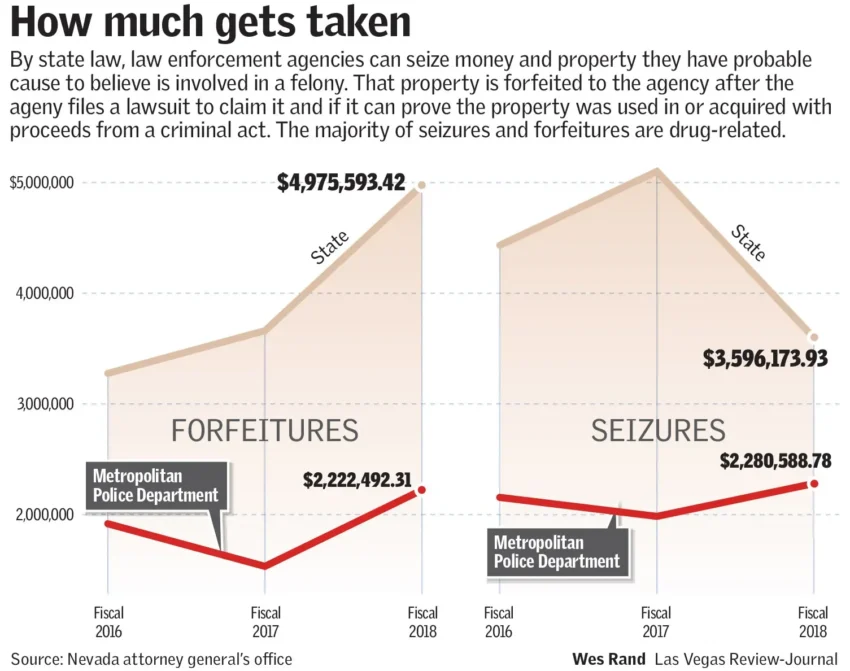Nevada forfeiture laws have come under scrutiny in recent years as residents become increasingly aware of how these regulations can lead to unjust property seizures. In particular, the case of Marine veteran Stephen Lara against the Nevada Highway Patrol (NHP) highlights critical issues surrounding asset forfeiture in Nevada. Lara’s experience shines a light on the complexities of civil asset forfeiture reform, especially concerning the federal adoption loophole that allows local law enforcement to bypass state restrictions. As a result of his lawsuit, not only was Lara able to recover his $86,900, but his case also sets a precedent that may protect others from similar unjust property seizure laws in Nevada. This landmark ruling is a significant step towards ensuring that all Nevadans are treated fairly and that law enforcement agencies are held accountable for their actions under these forfeiture laws.
In recent discussions surrounding property confiscation, Nevada’s asset seizure regulations have sparked a vital debate over their implications for residents. The legal principles governing the forfeiture of assets in this state are at the forefront of civil rights conversations, particularly in light of cases like that of Stephen Lara, who faced wrongful confiscation by state authorities. The complexities of these laws, often referred to as property seizure statutes, expose the challenges faced by citizens when local law enforcement exploits federal mechanisms to seize assets. This situation has raised calls for significant civil asset forfeiture reform, aiming to close loopholes and protect individuals from undue loss of their belongings. As Nevada navigates these contentious issues, the outcome of Lara’s legal battle may serve as a crucial turning point in the fight for fair treatment under the law.
Understanding Nevada Forfeiture Laws
Nevada forfeiture laws govern the legal framework surrounding the seizure of property and assets by law enforcement. These laws are designed to ensure that asset forfeiture is conducted fairly and in accordance with the rights of individuals. Historically, there has been significant controversy surrounding civil asset forfeiture practices in Nevada, as many residents have reported instances where their property was unjustly seized without sufficient evidence of criminal activity. The recent ruling in Stephen Lara’s case highlights the need for greater scrutiny of these laws and their application by local agencies.
The ambiguity present in Nevada’s forfeiture statutes has allowed law enforcement agencies, such as the Nevada Highway Patrol, to exploit loopholes for asset seizure. This has raised concerns about the potential for abuse and has sparked discussions about the need for civil asset forfeiture reform. Advocates for reform argue that clearer guidelines should be established to protect citizens from wrongful seizures and ensure that law enforcement agencies adhere to strict legal standards when pursuing forfeiture.
The Impact of the Federal Adoption Loophole
The federal adoption loophole is a significant aspect of the forfeiture debate in Nevada. This legal provision allows state and local law enforcement agencies to transfer seized assets to federal authorities, who can then manage the forfeiture process. While this may seem beneficial for law enforcement, it often circumvents state laws that are designed to protect the rights of individuals. In Stephen Lara’s case, the Nevada Highway Patrol’s utilization of this loophole enabled them to retain a large portion of the seized funds, despite the lack of clear legal authority to do so under state law.
This loophole not only raises questions about the legitimacy of asset seizures but also highlights the need for comprehensive reform in property seizure laws in Nevada. Critics argue that the federal adoption loophole undermines state regulations, allowing local agencies to bypass stringent requirements that would otherwise protect citizens from wrongful seizures. The fallout from cases like Lara’s illustrates the urgent need for legislative changes that would close this loophole and ensure that forfeiture practices align with the principles of justice and due process.
Civil Asset Forfeiture Reform in Nevada
The recent developments in asset forfeiture cases, particularly in Nevada, have sparked a renewed call for civil asset forfeiture reform. The case of Stephen Lara serves as a rallying point for advocates who argue that existing laws disproportionately favor law enforcement agencies at the expense of individual rights. Reform advocates are pushing for legislation that would impose stricter standards on how and when assets can be seized, ensuring that due process is upheld and that residents have a fair chance to contest wrongful seizures.
In addition to stricter regulations, reform efforts are also focusing on increasing transparency in the forfeiture process. This includes mandates for clear reporting on asset seizures and the outcomes of forfeiture actions. By shedding light on how often and under what circumstances forfeitures occur, lawmakers can better assess the impact of current practices and work toward creating a system that protects the rights of Nevada residents while still allowing law enforcement to effectively combat crime.
Challenges Presented by Property Seizure Laws in Nevada
Property seizure laws in Nevada present several challenges for both law enforcement and residents. One major issue is the lack of clear statutory authority for local agencies to engage in federal forfeiture programs, as highlighted in the ruling on Stephen Lara’s case. Without clear guidelines, law enforcement may act outside their jurisdiction, leading to unjust seizures that violate the rights of citizens. This creates a complex landscape where the legal rights of individuals are not adequately protected.
Additionally, the interaction between state and federal law adds another layer of complexity to property seizure cases. As demonstrated in Lara’s situation, the ability for local agencies to utilize federal loopholes can lead to confusion and inconsistency in enforcement. This highlights the need for clearer guidelines that delineate the responsibilities and limitations of law enforcement agencies when it comes to asset forfeiture, ensuring that all actions taken are both lawful and just.
The Role of the Nevada Highway Patrol in Forfeiture Cases
The Nevada Highway Patrol (NHP) plays a pivotal role in the enforcement of forfeiture laws within the state. Their actions can significantly impact the lives of individuals, as demonstrated in the case of Stephen Lara, where a routine traffic stop escalated into a contentious legal battle over the seizure of nearly $87,000. The NHP’s tactics, including reliance on drug detection tools that misled them about the legality of Lara’s cash, raise important questions about the training and protocols in place for officers when it comes to asset forfeiture.
Moreover, the NHP’s involvement in the federal adoption loophole demonstrates the need for clear oversight and accountability within law enforcement agencies. As the court ruling suggests, local agencies must have explicit authority to participate in federal forfeiture programs, which the NHP lacked in this instance. This serves as a reminder that proper training and adherence to state laws are crucial for maintaining public trust and ensuring that law enforcement agencies act within their legal parameters.
The Importance of Due Process in Forfeiture Cases
Due process is a foundational principle that ensures fairness in legal proceedings, particularly in cases of property seizure. In Nevada, the recent developments surrounding forfeiture laws highlight the critical need for law enforcement to adhere to due process when seizing assets. The case of Stephen Lara illustrates how the absence of due process can lead to significant injustices, as individuals may find their property taken without adequate justification or the opportunity to contest the seizure.
Ensuring due process in forfeiture cases requires not only adherence to state laws but also a commitment to transparency and accountability from law enforcement agencies. By upholding these principles, Nevada can protect the rights of its residents and prevent the abuse of power by local agencies. The ongoing discussions about forfeiture reform in the state are essential for fostering a legal environment that respects individual rights while still allowing law enforcement to effectively address crime.
Public Awareness of Asset Forfeiture Issues
Public awareness plays a crucial role in driving change regarding asset forfeiture laws in Nevada. As more residents become informed about the potential for abuse in forfeiture practices, there is a greater demand for legislative reform. The case of Stephen Lara has shed light on the complexities and shortcomings of current laws, prompting discussions among community members, activists, and lawmakers. Increased awareness helps to mobilize support for reform efforts aimed at safeguarding individual rights.
Furthermore, education about asset forfeiture can empower individuals to take action if they find themselves in a similar situation as Lara. By understanding their rights and the legal frameworks in place, residents can better navigate the complexities of property seizure laws. This grassroots awareness is vital for holding law enforcement accountable and ensuring that any changes to forfeiture laws are reflective of the community’s needs and values.
Future Prospects for Forfeiture Legislation in Nevada
The future of forfeiture legislation in Nevada remains uncertain, but the momentum generated by cases like Stephen Lara’s could lead to significant reforms. Legislative discussions are increasingly focused on creating laws that prioritize the rights of individuals while still allowing law enforcement to perform its duties effectively. As public awareness grows, there is potential for lawmakers to introduce bills that would address the issues highlighted by recent court rulings and community concerns.
Moreover, as more states take action to reform their asset forfeiture laws, Nevada may follow suit in order to align with best practices and protect citizens from unjust seizures. The goal of future legislation should be to create a more equitable system that balances the needs of law enforcement with the rights and protections of residents. By fostering an environment of collaboration and transparency, Nevada can work toward a forfeiture framework that is just, fair, and in line with the principles of democracy.
Frequently Asked Questions
What are the key aspects of Nevada forfeiture laws regarding asset seizure?
Nevada forfeiture laws govern the process of asset seizure, requiring local law enforcement to adhere to strict guidelines when confiscating property. These laws establish that forfeiture proceedings must occur in the county where the property was seized and mandate that seized funds be placed in interest-bearing accounts. This framework aims to protect residents from unjust seizures and ensures compliance with state regulations.
How does the federal adoption loophole affect asset forfeiture in Nevada?
The federal adoption loophole allows local law enforcement agencies in Nevada to bypass state restrictions by transferring seized assets to federal authorities. This means that local agencies can retain a significant portion of the forfeited assets, often up to 80%, despite lacking clear statutory authority for such actions under Nevada forfeiture laws. This loophole has raised concerns about potential abuses of power by law enforcement.
What impact did Stephen Lara’s lawsuit have on Nevada’s asset forfeiture practices?
Stephen Lara’s lawsuit against the Nevada Highway Patrol significantly impacted asset forfeiture practices by highlighting the misuse of the federal adoption loophole. The court ruled that local law enforcement must comply with state laws regarding forfeiture and cannot simply rely on federal processes to circumvent these regulations. As a result, Nevada residents are now less likely to experience unjust property seizures.
What are the restrictions on property seizure laws in Nevada?
Property seizure laws in Nevada impose strict requirements on local law enforcement, including the obligation for forfeiture proceedings to occur in the county where the seizure took place. Additionally, seized funds must be deposited in interest-bearing accounts. These restrictions aim to protect citizens from unwarranted asset forfeiture and ensure transparency in the process.
Are there ongoing reforms for civil asset forfeiture in Nevada?
Yes, there are ongoing discussions and reforms aimed at civil asset forfeiture in Nevada. Advocates for civil asset forfeiture reform are pushing for clearer regulations to prevent abuse and ensure that law enforcement agencies cannot exploit loopholes like the federal adoption scheme. The outcome of cases like Stephen Lara’s lawsuit is influencing legislative efforts to enhance protections for residents against unfair asset seizure.
What should residents of Nevada know about their rights under asset forfeiture laws?
Residents of Nevada should be aware that they have rights under asset forfeiture laws, including the right to challenge unlawful seizures. Understanding the legal framework and knowing that local law enforcement must follow strict procedural guidelines can help protect against unjust asset forfeiture. They should also stay informed about potential reforms and advocate for their rights regarding property seizures.
How do Nevada forfeiture laws differ from federal forfeiture laws?
Nevada forfeiture laws differ from federal forfeiture laws primarily in the requirements for asset seizure and the jurisdiction in which forfeiture proceedings must occur. Nevada laws impose strict local compliance, while federal laws can bypass these restrictions through mechanisms like the federal adoption loophole. This often leads to conflicts and confusion regarding which laws apply in specific forfeiture cases.
What is the significance of the ruling in Stephen Lara’s case for future asset forfeiture cases in Nevada?
The ruling in Stephen Lara’s case is significant as it clarifies that local law enforcement agencies in Nevada cannot bypass state forfeiture laws by relying on federal adoption. This precedent is expected to lead to more stringent adherence to state regulations, reducing instances of unjust property seizures and increasing accountability for law enforcement agencies.
What steps can individuals take if their property is seized under Nevada forfeiture laws?
Individuals whose property has been seized under Nevada forfeiture laws should promptly seek legal counsel to understand their rights and options. They can challenge the seizure by filing a petition in the court of the county where the seizure occurred and must gather evidence to support their claim for the return of their property.
| Key Point | Details |
|---|---|
| Lawsuit Outcome | Stephen Lara successfully recovered $86,900 after suing the Nevada Highway Patrol. |
| Federal Adoption Loophole | NHP used a loophole allowing them to keep 80% of seized assets by involving federal agencies. |
| Court Ruling | The court clarified that local law enforcement must comply with state laws regarding forfeiture. |
| Impact on Nevada Residents | The ruling is expected to reduce unlawful seizures by local law enforcement in Nevada. |
| Legal Ambiguity | Nevada law does not clearly authorize or prohibit federal adoption of forfeitures, leading to misinterpretations. |
Summary
Nevada forfeiture laws have been significantly impacted by the recent ruling in Stephen Lara’s case against the Nevada Highway Patrol. The court’s decision not only resulted in Lara recovering his seized funds but also established a precedent that will protect other residents from unjust property seizures. This ruling emphasizes the necessity for local law enforcement to adhere strictly to state laws regarding asset forfeiture, closing loopholes that previously allowed for abuse. As a result, Nevada residents can feel more secure knowing that their rights against unwarranted seizures are now better protected.






